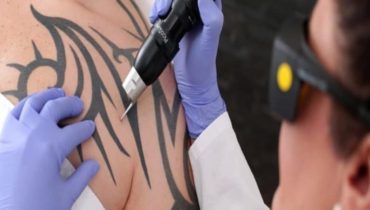None of us can deny the disparity of pay that comes with pursuing a career as an artist – be it a fine artist, creative writer or a tattoo artist for that matter. When you are in a conventional job, you enjoy a stable, but that tends to stagnate after a certain point in time. On the other hand, independent artists are faced with an overwhelming degree of instability until they reach a point of continuous growth in their earnings.
The biggest misconception associated with making a career as an artist pertains to the diversity of skills one needs to master. If a person is considered ‘good’ in drawing, that certainly is not enough to make them an artist, more importantly a tattoo artist.
The most common career path individuals take to become tattoo artists is an apprenticeship or informal training from an experienced and well-known tattoo artist. Even though one does not necessarily require formal education or degree to become a tattoo artist, some artists do take art classes in their respective schools or community centers that help them understand the foundation for this discipline.
The standard training time recommended by the Alliance of Professional Tattooist is at least 3 years during which the tattoo students learn about everything there is about tattooing, such as knowledge of the type of tattoo machinery, its operation and sterilizing it, etc.
Also, tattoo students are required to make a professional portfolio of their best work that will support them to enhance their reputation in the industry.
Moreover, many states in the US and the UK require certain licenses from individuals to run their independent system. Even though license requirements vary from one state to another, licensees are generally required to complete a certain number of training hours to prove their ability in written and practical examination.
Indeed, a successful tattooing career is no longer dependent on passion and natural talents, individuals need to meet a number of different requirements before they make a living out of it. There are a number of different factors that determine the annual earnings of a tattoo artist – the number of years in the industry, their portfolio, and certifications, etc.
Independent Contractors vs. Employees
Contents
Like every industry the tattoo industry too has a business structures with owners, full-time and part-time employees. So an individual’s earning is primarily dependent upon the way they establish their place in the industry. One certainly does not need to be a tattoo shop owner to be the highest paid person in the industry.
As a matter of fact, a lot of times when people join this industry their main desire is to practice autonomy and independence with their work. For this reason, artists prefer to have their own space, regardless of the earning potential and losses associated with it.
Permanent employees are usually paid a fixed amount every month that is decided during their hiring process similar to conventional hiring, but the compensation process with independent contractors is a bit different. So part-timers are either required to give a portion of their income to tattoo shop owners, which usually lie between 20% and 50%, or pay a fixed charge at the end of the month to the tattoo parlor owner.
A lot of tattoo artists prefer to work half-time or on contract, growing their clientele in different locations and getting a higher pay on their way. Apart from the big bucks, they enjoy the unbridled freedom and flexibility that comes with being a part-time employee. The nature of the artist’s work greatly influences their total earnings.
For instance, if a tattoo parlor owner hires a full-time tattoo artist he/she would most likely have to withhold income taxes, social security and medical taxes while paying unemployment tax with their wages. On the other hand, independent contractors are liable to report and pay their own income taxes. Every independent contractor receives a Form 1099 for their autonomous services according to which they must report their income under schedule C and pay self-employment tax on their net profit.
On the other hand, if the tattoo shop owner hires full-time employees, they are not only liable to work out the necessary operating expenses for their store, but the entire administrative and reporting requirements associated with their and their employee’s salary. Indeed, it can get a bit overwhelming at times, but individuals who cherish their independent setup accomplish these tasks with ease.
If you are a tattoo shop owner you should be very careful while classifying your tattoo artist as internal personnel or independent contractors. When tattoo shop owners misclassify this information, they can come under the IRS radar as they lose on revenues and that can lead to some serious consequences as well.
Male vs. Female
There is a long and detailed history when it comes to women fighting for their equal rights in the workplace. It was not until 1963 when the Equal Pay Act was passed and women were able to take action against pay discrimination. However, the act did not cover certain industries, such as domestics, agricultural work, and professionals to name a few. And so women were not able to work in these fields up until 1972 when an amendment was passed.
It took almost 60 years for women to enter the tattoo industry that was started by Maud Wagner – first female tattoo artist. Women can certainly learn a lot from Vyvyn Lazonga’s experience who suffered a great deal during her apprenticeship under Danny Danzl. Being mistreated by her mentor and seeing her male colleagues get promoted was part of her routine, but she would often have to bear with the crude and snide comments from male customers for her tattoos.
In the past as well as today, women would often enter this profession with the help of a mentor or under the apprenticeship of some male artist. Meanwhile, women who did not have any prior connections would often struggle to gain stability in their profession.
When it comes to tattoos, the discrimination does not end at pay. To this day, women with tattoos are judged more harshly than their male counterparts. According to a recent survey, it was found that approximately 45 million Americans have at least one tattoo on their body, and 36% of these participants are between the ages 18 and 25.
Fortunately, times and people have changed so much so that Kat Von D and Stephanie Tamez come under the list of top 10 highly paid tattoo artist. Even though the individual mindset toward a female tattoo artist is gradually changing, we still have a long way to go before the prejudice is eliminated.
As per Kerry Burke, the average earning of a tattoo artist varies from one location to another. For instance, in some parts of America male and female practitioners are able to earn around $32,000 a year, while in Boston it was reported that tattoo artists can earn about $55,000 a year.
Moreover, the earnings of male and female tattoo artists greatly depend on the season as well. For instance, Valentine’s Day or Halloween are among the top seasons for tattooing as people choose to have their loved ones names or emotions etched on them permanently. So according to numerous tattoo artists, busy seasons and their luck influences their annual earnings.
As per States
Indeed, becoming a tattoo artist might not be as difficult as earning from the profession. This is because the rules and regulations one has to follow to become a tattoo artist differ from one country to another, and that directly influences the potential earnings for an individual.
Let us take the example of the UK. If an individual is working on a permanent basis, then they will be compensated with basic pay with a monthly commission on the number of tattoos that they will etch. On the other hand, people who are self-employed rent a chair in a shop and split their hourly rate between themselves and the shop owner, which can vary from 50/50 to 40/60.
A market survey shows that the average salary of a tattoo artist in the UK is approximately £29.19 to £45.97 per hour, which makes it around £21,821 per year. Tattoo artists with high-profiles can earn up to £60,000 a year. On the other hand, a tattoo studio owner can earn an annual salary of up to £36,725, which is also equal to their contractual and permanent employees.
Even though an individual has to incur the cost associated with running their tattoo studio, they benefit by retaining 100% of their hourly fees and a significant portion of their employee’s fees as well.
In the United States, the stats for tattoo artist earnings are quite different. As per ZipRecruiter annual salaries were as high as $314,500. On the other hand, they also hit the record low of $12,000. A majority of tattoo artists in the United States currently earn between $50,000 and $260,000; however, these numbers tend to differ from one state to another.
For instance, in Las Vegas, the annual pay for a studio artist was $39,263 a year. The highest pay of a tattoo artist was as high as $68,480 while $15,803 was the lowest. On the other hand, the highest earning figure seems to decline in New York City as $50,365 was recorded as the highest earning of a tattoo artist, with the lowest being close to the minimum wage rate of $10.00 per hour.
Years of Experience
In the initial years of a tattoo artist’s career when they have completed their apprenticeship and got their license, they start earning as an entry-level tattoo artist. Since they are new to the industry their pay usually varies from $15,000 to $23,000 a year.
After being in the business for a couple of years, their earnings grow and reputation improves. According to PayScale, a tattoo artist with intermediate skills tends to earn about $30,000 a year on average, while people with greater expertise can reach up to $40,000 as well.
So, after almost a decade or more in the tattoo industry, the artist is considered experienced, and their name is a reflection of their work. These expert tattoo artists tend to charge up to $1000 per hour for their work, but rest assured it takes a lot of dedication and hard work to reach that point where you can charge such exorbitant rates.
An expert artist is reported to earn about $150,000 a year, with the exception of some of the highest paid artist, such as Scott Campbell who charges $2000 per hour.
Apart from the above mentioned factors, there are a number of different factors that will determine the salary of a tattoo artist. For instance, the types of tattoo that an artist wants to get familiar with and the locality in which they are rendering their services can make a huge difference on their pay.
It was reported that people from the county prefer getting more conventional tribal tattoos, while people in the city are more likely to get the latest styles of tattoos. So, if the individual is catering to the wrong set of target audience, he might not be able to earn as much.
Similarly, the popularity of one’s work and their speed are other variables that affect their level of earning in this profession. Even though these factors are often associated with experience, they can be accomplished by the artist at any point in time during their career.
So, make sure that you have the necessary expertise of a tattoo artist, and work with dedication and consistency to make your profession lucrative. Just remember that these creative fields like fine arts or tattooing are initially full of struggles, but with sufficient efforts and dedication, they are surely rewarding.

